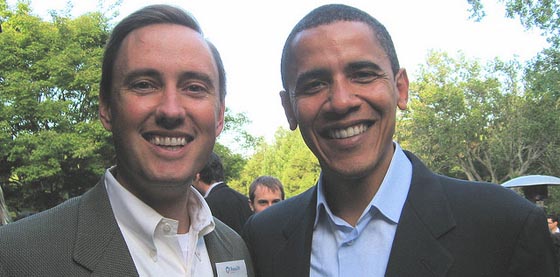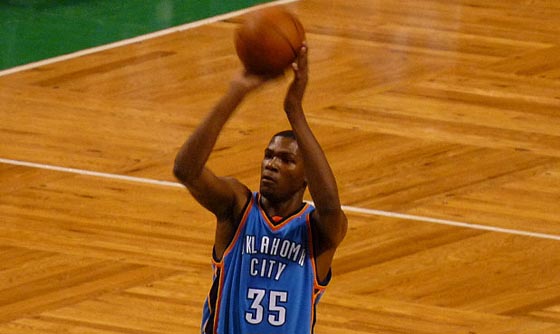A while back I talked about how using social networks focused on exclusivity like Path and Facebook Groups can give less social media savvy athletes an outlet in case they want to blow off some steam or share things with their intimate family and friends. This week, I want to talk about how exclusivity can help elevate the brand of athletes who are already doing a good job with social media and want to take it to the next level.
Before I begin, I want to make something clear. I am in no way suggesting that athletes ought to focus on using exclusive networks in lieu of mainstream public social networks, but rather as a complement networks like Twitter and Facebook in order to grow their brand in more creative ways.
Now back in 2008 when I first joined Twitter, it wasn’t long before I got an interesting email. It was titled:
Barack Obama is now following you on Twitter!
At the time, I thought I was so cool. A presidential candidate (and now better known as President Obama) was following what lil ‘ol Canadian ME had to say! It made me feel valued and heard. Then, I found out that it was a well thought out marketing campaign. Mr. Obama followed everyone who followed him back. Oh.
Some time later on, I got my first @mention on there from an NBA athlete. Once again, I was pumped. He responded to one of my questions with a crisp and cool “yup“. I was totally floored.
Even today with tons of athletes responding to fans everywhere, there still isn’t much that can top being recognized by a professional athlete. It can absolutely make a fan’s day. But for athletes who want to get ahead, here’s what they can do:
Leverage Exclusivity to Recognize the ‘Superfans’
With the increase of users and more and more athletes ‘getting it’, getting an @mention may already not mean as much as it once meant anymore. Kids growing up now will find it no big deal that they can holler at their favorite football player on their cell phone because they never had to wait 2 hours in the pouring rain just in hopes to catch a glimpse of their hero and maybe a high five. But for the die hard fans? They’re going to want more than ‘yup’ (I know, spoiled, right?).
Using networks that promote exclusivity and small groups can help give them that. What if instead of an athlete simply replying to your message, they know you personally well enough to ask how your sister or your brother is doing? That would be taking engagement to another level. As an example, I’m going to use Kevin Durant, a fairly well known guy who’s already doing all sorts of great things with his brand (If you’re reading this Kevin, call me!)
- Create a private Facebook Group called KD’s Superfans, and limit it to 35 members.
- Announce a contest on his blog asking readers to provide a YouTube clip of themselves proving that they are Durant’s #1 fan.
- Pick the 35 ‘best’ entrants and give them access to the group.
- Provide them with exclusive personalized content, goodies, and pre-release versions of his shoes. Ex. if Durant enters the 3 Point Contest, the superfans will be the first to know.
- Interact with them on a name by name basis.
Athletes are busy people, I get that. Expecting them to know the names of all their fans is impossible. But in the same way that more and more athletes have found 30 minutes out of their day to interact with fans on Twitter, they can spend an hour a week giving a small group of diehard fans some extra love.
The thing is, superfans will become viral brand ambassadors of their own for Durant. They’ll feel proud to be part of the group – an exclusive group that they had to work to get in and will tell everybody they know that they’re in. Unlike President Obama who added everybody in 08, exclusivity can recognize the special fans for who they are and they’ll be happy to return the favor.
What do you think of using exclusivity to recognize the superfans? Are there other ways that exclusive networks can help elevate athletes’ brands? I’d love to hear your thoughts, please let me know in the comments below!
###




Interesting thoughts! I think you’re right. Eventually, we’re going to reach a point in time where a simple @ reply won’t mean that much to a fan. Using a platform like Facebook Groups or Fast Society to connect on a more personal level could be a great idea. There are a couple of issues, though. 1) Athletes are super busy. But, like you said, they can spare an hour per week to interact with their super fans. 2) Athletes are very private, and understandably so. Opening themselves up to fans, in that nature, could be a security risk, in their eyes. 3) When an athlete has thousands and thousands of fans, limiting his super fans to a group of 20-30 could make people upset.
I agree with you in the sense that as it becomes more and more normal to connect with athletes and other celebrities, they’re going to have to find new ways to engage. However, at a certain point, we also have to be considerate of their time and privacy. Great article, Sam!
@gosam thanks a lot, sam! I can always count on your insight since you have worked with a bunch of athletes in the past.
I definitely don’t think this idea is for everyone, and will only for those who really want to take their brand to the next level in which case they would have to sacrifice a bit more of their time and privacy. Also, I think convincing athletes to spend that extra time is the real battle!
Great article. I think in today’s sports environment there are more and more player brands out there and it’s becoming more difficult for an athlete to put their brand on the forefront. Even when an athlete’s brand becomes prominent it’s difficult to keep it like that. Your idea about exclusivity and social media makes a lot of sense for certain athletes. SO important for them to connect with their fans on several levels.
@KevinDer I partly agree.
I understand why you would think it’s more difficult, but compared to before when mainstream gatekeepers in play and you had to be Crosby or Ovechkin to get on sportscenter? It’s a heck of a lot of easier to get on Twitter and Facebook and start building brand equity.
But, as more and more athletes do that, using Twitter and Facebook will become diluted and the norm, and that’s where ideas like the one I suggested come into play. At the same time, I believe the cream will rise to the top (is that a saying?) and the best at building their brands (and playing their respective sports) will continue to have the biggest following. It’s just more of an equal opportunity thing.
Plus, at this rate, thery’ll be no jobs for people like you and me if we simply focus on “engaging using Twitter” 🙂 Gotta push that envelope!
Thanks for your comments Kev, much appreciated!
Love it, I believe you’re right on the money.
Yes, go wild ladies!!!! I am a phsaciyl therapist with over 20 years of experience with people and sportspeople it’s the best thing you can do, you will only feel better and also your metabolisme will love you for doing so! Mari is awesome just follow her, she knows all you need about it!